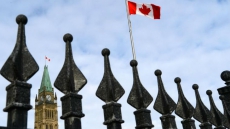OTTAWA - Canada's spy agency is moving quietly ahead with plans to collect and use databases containing personal information about Canadians, newly released documents show.
The Canadian Security Intelligence Service says the initiative — made possible by sweeping security legislation passed last year — will enable the agency to crunch large volumes of information and detect previously unseen patterns.
However, the new power to gather, sift and keep Canadian datasets worries civil liberties advocates.
The government should give Canadians a better sense of the kind of information CSIS is now allowed to exploit, given the existing dangers of falsely identifying people as security threats, said Tim McSorley, national co-ordinator of the Ottawa-based International Civil Liberties Monitoring Group.
"It would help to ensure that Canadians' rights are being protected," McSorley said in an interview.
In a broader sense, McSorley questioned whether "we want to be moving in this direction of intelligence agencies collecting and retaining vast amounts of information?"
Memos disclosed to The Canadian Press under the Access to Information Act show CSIS set the process in motion last July with a request to Ralph Goodale, public safety minister at the time.
The spy service asked Goodale to approve proposed classes of Canadian datasets, a step intended to ensure accountability for the data program.
"Data analytics is a key investigative tool for the Service, providing CSIS with the capacity to make connections and identify trends that is not otherwise possible through traditional methods of investigation," says a memo to Goodale from CSIS director David Vigneault.
Under the regime, the public safety minister may approve a class of datasets for CSIS collection if the class is considered relevant to the spy service's investigative efforts. The federal intelligence commissioner, Jean-Pierre Plouffe, reviews the minister's conclusions to determine if they are reasonable.
Once CSIS collects a dataset, a designated employee must determine whether it falls within an approved class. During this evaluation period, operational use of the data is prohibited.
In addition, the intelligence service must apply to the Federal Court of Canada if it wants to keep a Canadian dataset. Following court approval, the datasets may be queried by CSIS only when strictly necessary for its investigations.
A note to Goodale from his officials cautioned that the first year of the dataset regime would be "a learning process" informed by feedback from the intelligence commissioner and the Federal Court on the new provisions set out in the CSIS Act, the law governing the spy service.
"As this is the first time that you are determining these classes, there is uncertainty in how the (intelligence commissioner) and the Federal Court will interpret the statute."
Details about the classes of data CSIS planned to collect, including the rationale for each one, were deleted from the memos for security reasons.
The office of current Public Safety Minister Bill Blair said the legislation establishing the dataset system was informed by the most transparent public consultation process on national security in Canadian history. "With this bill, we have improved accountability for our national security and intelligence agencies and ensured that our security agencies can keep pace with evolving threats."
Eligible datasets should be limited to information that is demonstrably linked to a threat to Canadian security, not data that is simply likely to help CSIS identify eventual threats, said McSorley.
For instance, a dataset might include information about Canadians who travel to and from certain countries of interest to CSIS. McSorley questions if it makes sense for the intelligence service to retain that sort of information when many Canadians in the database might have legitimate reasons for making such trips.
At the very least, there could be more public disclosure about the destinations of interest, he said.
"I think they could do that without damaging Canada's national security."



